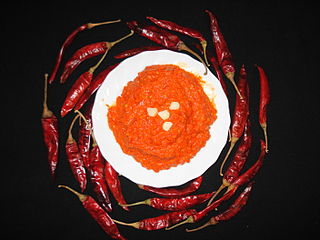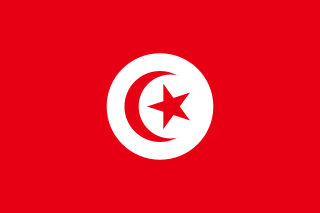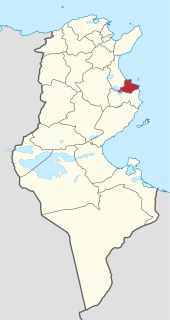
Tunisia is in the process of economic reform and liberalization after decades of heavy state direction and participation in the economy. Prudent economic and fiscal planning have resulted in moderate but sustained growth for over a decade. Tunisia's economic growth historically has depended on oil, phosphates, agri-food products, car parts manufacturing, and tourism. In the World Economic Forum Global Competitiveness Report for 2015-2016, Tunisia ranks in 92nd place. Based on HDI latest report, Tunisia ranks 96th globally and 5th in Africa.

Zine El Abidine Ben Ali, commonly known as Ben Ali, is a Tunisian former politician who served as President of Tunisia from 1987 until his ousting in 2011. Ben Ali was appointed Prime Minister in October 1987, and he assumed the Presidency on 7 November 1987 in a bloodless coup d'état that ousted President Habib Bourguiba, who was declared incompetent. Ben Ali was subsequently reelected with enormous majorities, each time exceeding 90% of the vote; the final re-election was on 25 October 2009.
The Tunisia national football team, is the national team representing Tunisia in association football since their maiden match in 1957. The squad is under the global jurisdiction of FIFA and is governed in Africa by CAF. It is governed by the Tunisian Football Federation, founded in 1957 after the Tunisian independence in 1956. Tunisia are colloquially known as Les Aigles de Carthage. The team's colours are red and white, and the Bald eagle its symbol. Periods of regular Tunisian representation at the highest international level, from 1962 to 1978, from 1994 to 2008 and again from 2014 onwards. Most of Tunisia's home matches are played at the Stade Olympique de Radès in Radès since 2001.

Tunisian Arabic, or Tunisian, is a set of dialects of Maghrebi Arabic spoken in Tunisia. It is known by Tunisians: its 11 million speakers as Tounsi[ˈtuːnsi](listen) (تونسي) "Tunisian" or Derja "everyday language" to distinguish it from Modern Standard Arabic, the official language of Tunisia.

The Tunisian Football Federation is the governing body of football in Tunisia. It was established in 1957. It became a member in the FIFA in 1960, and in the same year it also became a member in the CAF association. It organises the football league, the Tunisian Ligue Professionnelle 1, the Tunisia national football team and the Tunisia women's national football team. It is based in Tunis.

Espérance Sportive de Tunis, also known as EST, ES Tunis, Espérance ST, Espérance de Tunis or Espérance, is a sports club based in Tunis, Tunisia. It fields several sport teams, including football, handball, and volleyball. Espérance is the most popular club in Tunisia. The Stade Olympique de Rades is the club's home stadium.

This page lists the holders of the office of Head of the Government of Tunisia. The post was called Prime Minister until the Revolution, though that title is still used by many sources outside Tunisia. The office was created in May 1922. Mustapha Dinguizli was thus Tunisia's first Prime Minister in the modern sense. Prior to that, Tunisia had traditional Muslim-style viziers.

Tunisian cuisine, the cuisine of Tunisia, is a blend of Mediterranean and desert dwellers' culinary traditions. Its distinctive spicy fieriness comes from the many civilizations which have ruled the land now known as Tunisia: Romans, Vandals, Byzantines, Arabs, Spanish, Turkish, Italians (Sicilians), French, and the native Punics-Berber people. Many of the cooking styles and utensils began to take shape when the ancient tribes were nomads. Nomadic people were limited in their cooking implements by what pots and pans they could carry with them. The Tunisian tagine, is very different from the Algerian or Moroccan dish. It is a type of a pie dish, made out of eggs, meat and vegetables, similar to the Italian frittata or the eggah.

The Tunisian passport is issued to citizens of Tunisia for international travel.

Tunisia – United States relations are bilateral relations between Tunisia and the United States.

Harissa is a Tunisian hot chili pepper paste, the main ingredients of which are roasted red peppers, Baklouti (بقلوطي) pepper, serrano peppers, and other hot chili peppers, spices and herbs such as garlic paste, coriander seed, saffron, rose, or caraway, as well as some vegetable or olive oil for preservation.

The French protectorate of Tunisia was established in 1881, during the French colonial Empire era, and lasted until Tunisian independence in 1956.

The Tunisian Revolution was an intensive campaign of civil resistance. It included a series of street demonstrations which took place in Tunisia, and led to the ousting of longtime president Zine El Abidine Ben Ali in January 2011. It eventually led to a thorough democratization of the country and to free and democratic elections.

Tarek el-Tayeb Mohamed Bouazizi was a Tunisian street vendor who set himself on fire on 17 December 2010, which became a catalyst for the Tunisian Revolution and the wider Arab Spring against autocratic regimes. His self-immolation was in response to the confiscation of his wares and the harassment and humiliation inflicted on him by a municipal official and her aides.

Mohamed Beji Caid Essebsi is a Tunisian politician who has been President of Tunisia since December 2014. Previously he served as Minister of Foreign Affairs from 1981 to 1986 and as Prime Minister from February 2011 to December 2011.

On 18 March 2015, three militants attacked the Bardo National Museum in the Tunisian capital city of Tunis, and took hostages. Twenty-one people, mostly European tourists, were killed at the scene, and an additional victim died ten days later. Around fifty others were injured. Two of the gunmen, Tunisian citizens Yassine Labidi and Saber Khachnaoui, were killed by police, and the third attacker is currently at large. Police treated the event as a terrorist attack.

On 26 June 2015, a mass shooting occurred at the tourist resort at Port El Kantaoui, about 10 kilometres north of the city of Sousse, Tunisia.
The Tunisian National Dialogue Quartet is a group of four organizations that were central in the attempts to build a pluralistic democracy in Tunisia in the wake of the Jasmine Revolution of 2011.


















